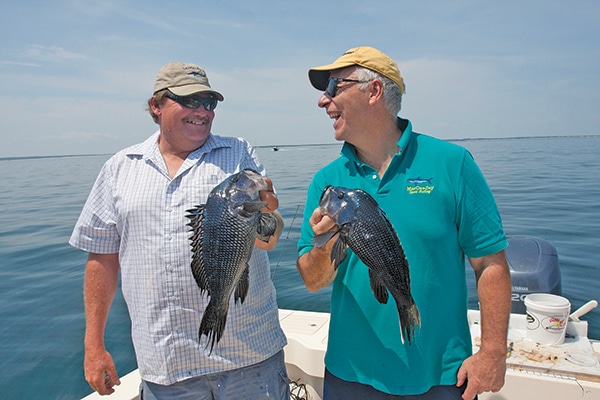
mp rip
For those who follow the world of fisheries management and all the perceived black magic that seems to go on, there has been a lot of discussion about changing the Magnuson-Stevens Act, which manages fisheries around our coasts, to add more flexibility. Some are certain that without more flexibility, the sport of fishing will come to a crashing halt. For others, there is already enough flexibility, and if anything, there needs to be more holding of the proverbial feet to the fire. The conventional wisdom is that not much of substance will be done on the MSA during this congressional session. This is likely the case, as Congress has not been a ball of fire getting really important things like federal budgets and immigration reform done, but who knows?
Data Differences
While all this attention has been focused on the MSA, the Mid-Atlantic Fishery Management Council undertook a strategic visioning process that culminated in 2012. One of the recommendations that came out of this visioning process was to look at managing recreational fisheries differently than commercial fisheries. It has been understood for years that the catch data generated for the recreational fishery is substantially different than that generated by the commercial fishery. Recreational anglers do not have to report their catches to federally permitted dealers; commercial fishermen do. The new Marine Recreational Information Program will make some beneficial changes to the collection of recreational data, but that program is still in the implementation phase.
At its June meeting, the MAFMC passed a suite of alternatives that potentially will begin a new era of federal recreational fisheries management. “The amendment responds to concerns expressed by stakeholders during the Visioning Project, and would temper the Council’s reactions to recreational overages by taking the uncertainty of the catch estimate into consideration before applying corrective management responses,”said Council Chairman Rick Robins.
Turning Point
An overage in the black sea bass fishery in the mid-Atlantic triggered this action, but it developed into an in-depth look at all recreational fisheries in that area. If ultimately approved by the Secretary of Commerce, the MAFMC recommendations would adapt the system of Accountability Measures to the existence of uncertain catch estimates and management controls associated with recreational fisheries. Under the new amendment, a management response (i.e., reactive AM) would be activated when the lower confidence limit or lower end of the range, rather than the point estimate, of recreational catch exceeds the Annual Catch Limit. If this condition is met, paybacks would be required in certain cases, such as when the stock is overfished (below a certain threshold) or when both the overfishing limit has been exceeded and the stock has fallen below a certain level. If those conditions are not met, accountability measures would consist of adjustments to the bag limit, size limit, and season to prevent future overages. In other words, this would incorporate flexibility under the existing Magnuson-Stevens Act.
Essential Accuracy
The MAFMC felt that paybacks might not be appropriate for recreational overages, particularly on healthy or rebuilt stocks, and that paybacks are more suitable to stocks undergoing rebuilding. Since recreational fishing is associated with an outlay of money, it is normal that effort will shift to stocks that will provide the greatest reward or simply those that are rebuilt. With this in mind, it is likely that recreational catches will exceed catch limits when those catch limits have been established based on incorrect estimates of future abundance. Because of the inherent variability of recreational fisheries, it is also impossible to estimate the correct overage that could or should be withheld as payback from an unknown future catch.
One Step Forward
The MAFMC had concerns**** about the impact of in-season closures as AMs for the recreational fishery. So it eliminated the regional administrator’s authority to put in-season closures in place. The concern was that these potential closures could have regionally disproportionate impacts to the recreational fishery as different areas start fishing at different times. Also, bookings for party/charter operations are made well in advance and do not allow the ability to change.
So, while many interested in fisheries management around the country have been wringing their hands over the perceived inability of the MSA to be flexible enough to deal with fluctuations in catch, particularly with rebuilt stocks targeted by sport fishermen, the MAFMC came up with a solution. At this writing, its alternatives still need to be approved by NOAA Fisheries, but since the MAFMC was smart enough not to completely reinvent the wheel, it’s likely the measures will be implemented. Our kudos go to the MAFMC and its staff. It saw a problem and then crafted a solution. It is likely that this will get other councils to re-examine their recreational measures and make them a little more flexible









